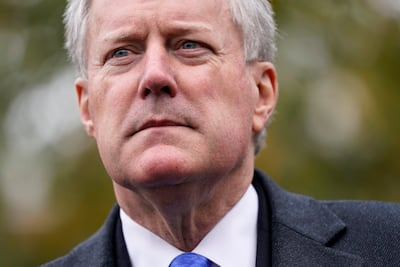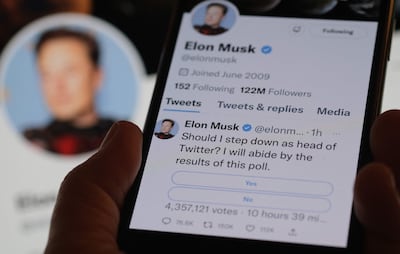Last week, two large dumps of what were originally assumed to be private conversations demonstrated the depth of discord among Americans. But the differences between the two sets of conversations and reactions to them are stark and revealing.
New Twitter owner Elon Musk sent private correspondence from within the company before he took over to several bloggers to try to prove it had been highly biased against the right and, especially, former US president Donald Trump. The political news website Talking Points Memo published 2,319 text messages to and from then White House chief of staff, Mark Meadows, as Republicans sought to overturn the 2020 election, setting the stage for the January 6 insurrection.
The failed coup remains the biggest dividing line in a fractured American polity. That is likely to get worse as the January 6 Committee is expected to recommend serious criminal charges against Mr Trump at their final hearing on Monday. They plan to urge the Department of Justice to charge Mr Trump with obstruction of an official proceeding, conspiracy to defraud the US, and, most significantly, insurrection.

It is just a recommendation, but it will further damage him. Mr Trump faces possible indictment in Georgia, related to the effort to overturn the election there. New York prosecutors are re-examining his payment of hush money to two of his former paramours. Mr Trump's then attorney, Michael Cohen, who made the payments, was sentenced to three years in prison.
Mr Trump's "major announcement" last week turned out to be an astonishingly cheesy offer of $99 virtual NFT "trading cards" depicting the former president in various pseudo-heroic poses. Even his closest allies expressed disgust at the demeaning spectacle, reminiscent of the worst late-night television.

In this context, Mr Musk released his "Twitter files" to several bloggers, urging them to demonstrate that the company conspired to support Democrats and harm Republicans, especially Mr Trump. Yet the messages don't demonstrate anything of the kind. What they show is an overwhelmed company struggling, and often failing badly, to establish and enforce reasonable and consistent content standards. That much was already obvious.
The messages reveal the former Twitter leaders were liberals, made mistakes, and blundered by blocking tweets linking to a New York Post article about a laptop supposedly belonging to President Joe Biden's son Hunter immediately before the 2020 election. Twitter even briefly suspended the Post's account, demanding they delete all references to the story, which Twitter suspected might have been Russian disinformation.
Amid an enormous backlash, the ban was quickly lifted. Twitter admitted it was a huge error. The "Twitter files" show the messy, often unpleasant, sausage-making that went into that aggressively pursued mistake. The right is indignantly insisting the messages demonstrate that Twitter, and they imply all major social media before Mr Musk, was constantly conspiring against conservatives and plotting to promote a liberal agenda. That is a considerable exaggeration. These "files" don't alter the essential narrative most sensible Americans have long ago concluded regarding these well-known Twitter controversies.
Moreover, the "files" are not being released in full, or with any transparency. They are being selectively published by certain bloggers selected by Mr Musk. The project would be a lot more credible if the public were shown the entire "files" rather than carefully curated titbits.
Mr Musk's arbitrary and authoritarian content management is infinitely more biased and less systematic than his predecessors. He has welcomed back some of the worst bad actors and suspended the accounts of those who have apparently annoyed him. He was even threatened with EU sanctions because of these abuses.
Whatever their failings, his predecessors were at least trying to establish a system and a clear process. For Mr Musk, “le tweet c'est moi". At least he seems to be having a jolly good time.

By contrast, the Mark Meadows text messages are deeply alarming. The former chief of staff provided them to the January 6 committee before he suddenly cut off all co-operation in December 2021.
Talking Points Memo and their investigative reporter Hunter Walker posted them in full, along with excellent analysis. The texts demonstrate a zealous commitment by numerous Republican notables and members of Congress to a coup and overturning the 2020 US presidential election.
Congressman Ralph Norman, for example, demanded the White House invoke "Marshall Law", a misspelling of martial law, also used in the same context – to suspend the Constitution and keep Mr Trump in power – by Congresswoman Marjorie Taylor Greene.
Some messages border on being incomprehensible and seem manic, spilling out into many hundreds of words. They embrace and promote ridiculous conspiracy theories from sources as farcical as a dodgy Romanian YouTube account.
Such conspiratorial ravings are not new to anyone who has ventured down the rabbit hole of right-wing extremism. They have a consistent style and illogic. What's new and truly shocking is that many Republican legislators appear to really believe them. Time and again they depict the country in an existential crisis or even war, often invoking a divine plan or the will of God to justify a coup.
When politicians spout conspiracy theories in speeches or on television, sensible people generally assume that they are just pandering and indulging in shameless political theatre. That's bad enough, but the Meadows texts appear to demonstrate that many elected Republicans earnestly and fervently believe this balderdash. That's incredibly frightening.
Some of them are actually being promoted. Representative Ted Bud, whose texts repeated preposterous theories about foreign manipulation of voting machines, has been elected senator from North Carolina, a major upgrade.
It's all very revealing.
The “Twitter files" show often unpleasant liberals trying, and frequently failing, to create a workable standards system. Mr Musk is treating Twitter as a personal playground to settle his grievances and explore his issues. He’s making them look like the proverbial stable geniuses.
The texts disturbingly demonstrate that many politicians who spout conspiracy theories in public also seem to believe them in private. Mr Trump's $99 virtual trading cards of himself as Superman and Rambo actually illustrate the depth of his diminishment.
Yet, Mr Trump is the essential figure conjoining the Meadows and Twitter messages. The Great Divider is still the centre of national disunity and chaos. The January 6 committee's forthcoming criminal recommendations bring him one step closer to the dock. It seems almost inevitable he will face criminal charges. That could drag American discord down to depths of acrimony Mr Musk can only dream of promoting.














